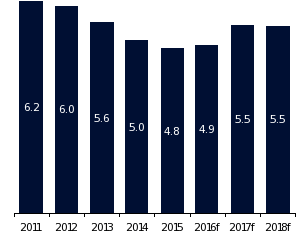Economic Commentary
Indonesia has long suffered from chronic supply bottlenecks that have congested the economy and dragged growth down below potential. In 2014, hopes were raised that the new president, Joko Widodo (aka Jokowi), would be able to implement his mandate to revitalise investment in infrastructure and clear out some of the logjams. It has taken a while, but it appears that some of the new president’s efforts may be beginning to bear fruit. Thirteen economic reform initiatives have been pushed through since September 2015, central government capital spending grew 47% in the first half of 2016 compared to a year earlier and growth appears to have risen off a recent low of 4.8% reached in 2015.
Real GDP Growth (% year-on-year)

Sources: Statistics Indonesia, Haver Analytics and QNB Economics forecasts
Indonesia’s supply bottlenecks are the consequence of past under investment and the country’s challenging geography. Indonesia was at the epicentre of the Asian Financial Crisis in 1997-98, after which government investment faded and the nation’s infrastructure fell into a dilapidated state. Additionally, Indonesia is an archipelago of around 18,000 islands, creating huge logistical obstacles. This adds considerable costs to doing business. It is 4–5 times more expensive to ship a container from Jakarta to West Sumatra than to Singapore; cement is ten times more expensive in Papua than Jakarta. Furthermore, the country is blighted by heavy road traffic, congested transport networks and widespread power and water shortages. All this drags on growth.
Having been elected in 2014 on the mandate of revitalising investment in infrastructure, Jokowi has finally managed to push through a number of economic reforms over the last year, including around 160 new individual regulations. These include improvements to the business environment through streamlined licensing procedures; the creation of a “one-stop shop” for new companies; lower energy tariffs; and measures to improve access to finance for small companies. Some of the measures also target increasing trade in certainsectors by providing tax relief on the import and sale of goods as well as streamlining the number procedures required to import goods. Finally, 29 areas of business have been opened to 100% foreign ownership, ownership limits have been raised in a further 29 industries and another 19 industries have been opened to limited foreign ownership for the first time.
As well as reforms, the government has stepped up infrastructure investment and has made progress on 30 priority projects worth USD415bn, including roads, railways, ports, power plants and oil refineries. Public investment spending increased to 27% of the budget in H1 2016 from 16% in the same period of 2015.The government is now set to roll out 336km of roads in 2016-17, about a third of the 1,060km Jokowi planned during his first five year term. This includes parts of the trans-Java toll network, which is already underway. Additionally, a high-speed railway from Jakarta to Bandung (Indonesia’s second city) received all necessary permits in August this year and a 720km railway project from Jakarta to Surabaya in East Java has been granted to Japanese investors.
Progress on the infrastructure investment programme is critical for Indonesia’s economic outlook. As a result of the programme and of other favourable head tail winds, we expect growth in Indonesia to pick up to around 5.5% in 2017-18 from 4.9% in 2016. Higher government investment as well as recent reforms to encourage foreign and private sector investment should push growth higher. We expect growth to be further lifted by recovering commodity prices and recent interest cuts by the central bank. Progress on the investment programme and rising growth should also support investor appetite and confidence in Indonesia. This reduces the capital flight risks that have also held back the Indonesian economy in recent years, particularly since the US started considering tightening its monetary policy stance in 2013. Therefore, we see the recent progress made on Indonesia’s investment programme as highly positive for the economic outlook in Indonesia.
